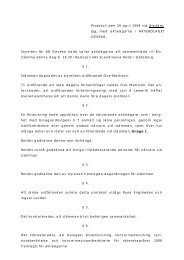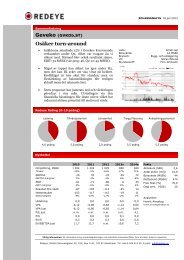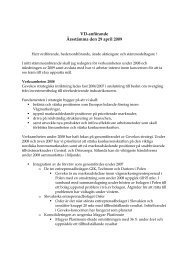PDF Document 2.46 MB - Geveko
PDF Document 2.46 MB - Geveko
PDF Document 2.46 MB - Geveko
You also want an ePaper? Increase the reach of your titles
YUMPU automatically turns print PDFs into web optimized ePapers that Google loves.
Financial risk management and sensitivity analysisFinancial risk management and sensitivity analysisThe parent company, AB <strong>Geveko</strong>,decides on all financing, investments,and currency risk management,while each company handlesits own transactions. A further role ofthe parent company is to support thesubsidiaries, when necessary, withloans or guarantees for loans raisedor guarantees issued by subsidiaries,as well as with the placement of surplusfunds. There is a central cashmanagement unit for the Swedishbusiness, which ensures efficientmanagement of all payment flows asa means of optimising net interest.The financial side of the businessis carried on in accordance with theGroup Control rules and financialpolicy adopted by the Board. Theseregulate how financial risks are to bemanaged, and within what limits theGroup’s companies may operate.Financial risk managementThe objective of <strong>Geveko</strong>’s financialactivities is to manage the Group’sshort- and long-term financing, aswell as effectively monitoring financialrisks.Liquidity riskBy financing risk is meant the riskthat it could become difficult or moreexpensive to finance the Group’scapital requirements or to refinanceits outstanding loans.BorrowingIndustrial Operations’ financing re -quirements follow a seasonal patternwhich means that more workingcapital is required in the first half ofthe year, when stocks and accountsMaturity structurereceivable are rising, followed by adecline in the second half of theyear. <strong>Geveko</strong> arranges these workingcapital credits for one year at a time.In 2007, the agreed credits totalledSKr 632 million. As of 31 December2007, undrawn lines of credit forSKr 111 million were available.Seasonal credits are primarilyraised by the parent company andpassed on to subsidiaries in the formof intra-group loans or capital in -jections. The parent company alsoguarantees local cheque accountcredits and loans. Loans are alsoraised against collateral in the formof property mortgages.Liquid fundsLiquid funds consist of short-termplacements and cash at bank. Liquidfunds are largely placed in highlyliquid, fixed income securities issuedby issuers with a high credit rating.Interest riskInterest risk refers to the effect onthe Group’s net interest of changesin market interest rates. Most of theGroup’s financing takes the form ofseasonal working capital creditsraised for Industrial Operations.All of these credits have a maximumduration of six months. Long-termloans, which amounted to SKr 310million on 31 December 2007, havean average duration of three years.The average rate of interest on theseloans was 5.6% at the end of 2007.Currency risk<strong>Geveko</strong> keeps its accounts in Swedishkronor, but the Group carries on itsInterest-bearing loansSKr millionMaturing in 2008 152Maturing in 2009 52Maturing in 2010 2Maturing in 2011 24After 2011 251business in many countries. Thismeans that the Group is exposedto currency risks as changes in ex -change rates can have an adverseimpact on its result and equity.Currency risks can arise fromowning shares denominated inforeign currencies or from currencyfluctuations that affect IndustrialOperations’ operative companiesin the form of transaction exposureand translation exposure.Transaction exposureTransaction exposures arise in theoperative companies’ commercialflows, since foreign sales account forsome 73% of Industrial Operations’total turnover. Since a large proportionof the costs are incurred in thesame currency as the income, transactionexposure is marginal. <strong>Geveko</strong>does not hedge this risk.The largest individual foreigncurrency is the Danish krone, whichaccounts for just over 23% of totalturnover.Translation exposureForeign subsidiary companies’ assetsafter deduction of liabilities representa net investment in foreign currency,which upon consolidation gives riseto a translation difference. In orderto limit the negative impact of translationdifferences on consolidatedequity, hedges are arranged by raisingloans in the currency in question.The effect of this is that a decline inthe value of the net investmentcaused by a higher krona exchangerate is offset by the currency gain onthe parent company’s borrowing. Thehedging of the Group’s net assets isarranged via the respective Swedishparent company. <strong>Geveko</strong>’s currencyrisk and its impact on the result arejudged to be low.78
















